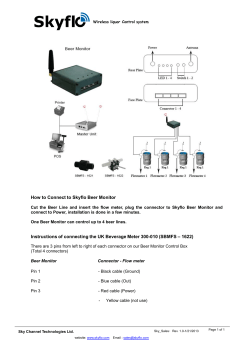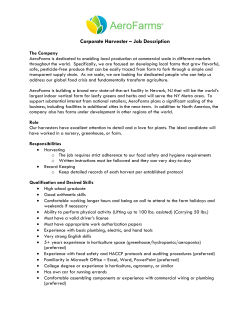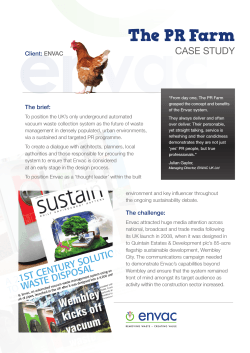
Farm Brewery_EB_FINAL - DRUM
EXTENSION BULLETIN Microbreweries and the New Class 8 Farm Brewery License PHOTO: Edwin remsberg Farmers with a class 8 Farm Brewery license may brew, sell, and serve their beer on the farm. M also need to comply with Federal regulations, and perhaps additional county or district laws depending on where the brewery will be located. One of these is the Class 8 Farm Brewery License. This license is just for farmers and is especially useful because it allows for on-site consumption of the beer, not just sale. Any farmer with a Class 8 farm brewery license may also sell and deliver beer from the farm brewery to a wholesale company or directly to an individual consumer. The license has an annual fee of $200 and the license application can be found online here. In addition to the requirements of this license, you will U.S. alcoholic beverage laws are complicated due to the fact that there are Federal, state, and local (including county and/or district) laws and each layer has specific requirements. Anyone who wants to sell and/or serve alcohol needs Federal approval, granted by the Alcohol and Tobacco Tax and Trade Bureau (TTB). If approved, you will receive a Brewer’s Notice, which is required to sell alcoholic beverages in the United States. The application process is completely online through the TTB website. There is no fee to apply for a permit, though you will need to have at least purchased, if not icrobreweries and craft beers are a growing trend nationwide. In order to encourage more development in this growing industry, the state of Maryland has created a few new liquor licenses that make small-scale brewing easier. 1 ALEI | EB | April 2015 installed, the brewing equipment before applying. The invoice for the equipment, containing the name of the company that made it, is a required part of the permit application. In some cases, part of the application process is an onsite inspection, which is why the TTB requires you to purchase the equipment first. You will need bond coverage as an alcoholic beverage producer, which also must be purchased before applying. Another Federal law to bear in mind is that commercial alcohol production cannot occur on a residential property. Even if your land is zoned as agricultural, your home (if it’s on the farm) is federally considered residential property. You will need to provide a variance form indicating that the residential portion of the property is perhaps on a separate parcel, or that the prospective brewing site is not part of the residential section of your property. It may help your application to include that you live in a designated agricultural zone if that is the case. Please see Appendix A for an example variance form written by TTB. Commercial alcohol production cannot occur on a residential property. Before submitting Federal applications, it is important to make sure your operation is compliant with any local (county or district) and Maryland state laws. The requirements of the Class 8 farm brewery license are outlined below. As required by the Class 8 farm brewery law, in order to sell and serve the beer on your farm, the brew 2 on your property into breweries. Your local agricultural marketing specialist can help you find the right people to talk to about these permits in the county offices. The Class 8 farm brewery law says that the license is granted to a farm, though the brewing facility may be located elsewhere. Although the brewing facility can be offsite, it will likely be easier to have your license approved if the brewery is actually located on your farm. Since this law is relatively new, some pieces of the law may change as more farmers, with different questions and capabilities, venture into this business opportunity. PHOTO: Edwin remsberg The Class 8 farm brewery law requires that in order to sell and serve the beer on your farm, the brew must contain at least one ingredient grown on your farm. must contain at least one ingredient grown on your farm. The law does not set a minimum percentage of how much of this ingredient you have to use. As of now, the license allows you to sell and serve beer regardless of local alcohol laws, with an exception made for Garrett County. Although the letter of the farm brewery law allows you to operate your business despite local laws that may restrict the sale and service of alcohol, it may be prudent to stay within the confines of the local ordinance. Since the Class 8 farm brewery license is relatively new, this provision may change in the future. Zoning codes must also be kept in mind. Depending on your local zoning and agro-tourism laws, there may be permits or permissions required before converting buildings You may only serve and allow consumption of the beer produced at the brewery listed on the license, unless you are hosting a multibrewery event. More details about multibrewery events and how to host one can be found at the end of the guide. Farmers with a Class 8 license may provide their beer for consumption on the premises for free or for a fee as long as each sample is less than six ounces. They are called “samples” because you can offer them for free or choose to charge per glass. A big difference between this license and other brewing licenses is that farm breweries are allowed to serve certain types of prepared foods. Getting a Class 8 license does not exempt you from any health and safety guidelines and you may receive and keep a license only if you comply with health and safety laws. The license allows for the sale of: • Chili • Chocolate • Crackers ALEI | EB | April 2015 • Cured meat • Fruit, whole and cut • Hard and soft cheeses, whole and cut • Ice cream • Jellies and jams • Pizza • Salads and vegetables, whole and cut • Soups • Vinegar and other condiments • Prepackaged foods that are ready to eat, like sandwiches You may serve food and beer between 10 am and 6 pm, seven days a week. After 6 pm, you may begin to sell beer for consumption off the premises as long as it is packaged in sealed or re-sealable containers like a growler. With this license, you may operate your farm brewery seven days a week, except in Garrett County, where you may operate on Sundays only in election districts or precincts where voters have approved Sunday sales at a farm. So far, there have not been any other exceptions made, so the letter of the law does allow you to serve and sell beer seven days a week, between 10 am and 10 pm, even if your local alcoholic beverage laws state otherwise. Again, since this is a relatively new law, some provisions such as this may change over time as more farmers set up farm breweries. Therefore, it may be wise to stay within the limits of any local alcohol ordinance in case the state laws governing the permit change in the future. In addition to serving and selling the beer on site, the license allows you to sell to wholesalers, both from Maryland and out of state. If you PHOTO: Edwin remsberg Like individual special events, multibrewery events or activities cannot last longer than three consecutive days. have an individual storage permit, the beer for wholesale can be stored on site, in a separate area from the beer meant for direct sales. Since this will be storage area, you won’t be able to sell beer for direct consumption by customers out of this area. You can only sell and serve beer produced at your brewery during a special event. You may sell, bottle, and/or contract for up to 15,000 barrels of beer in a calendar year. Even if you are brewing your own beer, you may sell the ingredients you grow, such as hops or grain, to other producers if you choose to do so. You may also contract transportation companies to transport your beer to festivals and return any unused beer, as long as the contract is in writing and you don’t have a franchise with a distributor under the Beer Franchise Fair Dealing Act. An effective way to market your business is to hold special promotional events at the brewery, which require a special event permit. The Office of the Comptroller requires a notice of the event be filed at least 15 days before the event by using Form 385, found here. The beer you serve at special events can only be served by the glass and not for consumption off the premises, such as in a sealed can or a growler. The samples cannot exceed 6 fluid ounces per brand. That means each individual sample must be 6 ounces or less. Special events can be held between 10 am and 10 pm, seven days a week, but can’t last longer than three consecutive days. You may obtain up to 12 special event permits a year and each permit costs $25. As mentioned earlier, you can also sponsor a multibrewery event or activity, which lets you work with other Maryland breweries and allows for the sale of products from these companies, not just your own. Regardless of the time of this event, 3 ALEI | EB | April 2015 which may be between 10 am and 10 pm, seven days a week, beer cannot be sold for consumption off the brewery. This means the beer must be served by the glass. If you have an individual storage permit, you can store the beer from the other brewers on site for the multibrewery activity. Like individual special events, multibrewery events or activities cannot last longer than three consecutive days. PHOTO: Edwin remsberg Many farmers looking into this brewing license may be interested in including hard cider in their brewing operation. Many farmers looking into this brewing license may be interested in including hard cider in their brewing operation, which is also experiencing a comeback in the United States. In Maryland, hard cider can be made with apples or pears and must contain less than 7% alcohol content. A unique and confusing difference between Federal and Maryland law is that hard cider in Maryland is taxed and regulated like beer, but federally it is taxed and regulated like wine. This means if you want to produce hard cider, you’ll need a Federal winery license. If you plan to make beer and hard cider, you will need to submit two separate applications, one for the brewery and one for the “winery.” And rather than using the same area and equipment for both making beer and hard cider, the TTB prefers you to have two separate facilities, each with its own equipment and storage areas. As with any law, there are some highly specific requirements and some provisions may change in the future, so it is important to be well-informed about the license before starting a farm brewery. Good resources include your local agricultural marketing specialist, the TTB website, and your local zoning board, if you have one. Despite challenges that may come with the new venture, the explosion of demand for local, small-scale breweries coupled with this new farm brewing license is an exciting opportunity for farmers interested in expanding or diversifying their business. n Special thanks to Sean T. Morris of The Morris Law Firm, LLC of Bethesda, Maryland for his input into this guide. Links 1. Class 8 farm brewery license application can be found here: http://forms.marylandtaxes.com/alcohol_forms/367.pdf 2. Alcohol and Tobacco Tax and Trade Bureau Brewer’s Notice application can be found here: http://www.ttb.gov/beer/qualify.shtml 3. Form for hosting special events (Form 385) can be found here: http://forms.marylandtaxes.com/alcohol_forms/385.pdf 4. General information, including Frequently Asked Questions, about the federal permit process can be found here: http://www.ttb.gov/beer/ 4 ALEI | EB | April 2015 Appendix A: Sample Variance Form for Farmers with Residences on the Farm Property Variances should be addressed to the Director, National Revenue Center. The following is an example of a variance: On behalf of John Doe Brewery, and pursuant to 27 CFR 25.52 “Variations from Requirements”, we respectfully request approval of an alternate method of operation from that prescribed at 27 CFR 25.21, “Restrictions on location”, with respect to establishing and operating a brewery in a dwelling house. The alternate method of operation is to use a specific area of our residence as brewery premises. John Doe Brewery makes this request due to (The applicant should give specific reasons why they wish to use their residence to establish a brewery instead of, for example, using a commercial building for their brewery location) Consequently, such use will not impede the effective administration of regulations and will not jeopardize revenue interest. We understand that approval of the above request for an alternate method of operation may be rescinded at any time should TTB determine that there is administrative difficulty or jeopardy to the revenue. Sincerely, ‘Person Signing on behalf of the Applicant’ 5 ALEI | EB | April 2015 Author In Partnership with This project was supported by the Beginning Farmer and Rancher Development Program of the National Institute of Food and Agriculture, USDA, Grant #201249400-19552. To find more resources and programs for beginning farmers and ranchers please visit www.Start2Farm.gov, a component of the Beginning Farmer and Rancher Development Program. The Agriculture Law Education Initiative is a collaboration between the University of Maryland Francis King Carey School of Law and College of Agriculture & Natural Resources, University of Maryland, College Park. Through the University of Maryland Extension - the statewide, non-formal agriculture education system - the collaboration partners with the School of Agricultural and Natural Sciences, University of Maryland Eastern Shore. The University of Maryland: MPowering the State brings together two universities of distinction to form a new collaborative partnership. Harnessing the resources of each, the University of Maryland, College Park and the University of Maryland, Baltimore will focus the collective expertise on critical statewide issues of public health, biomedical informatics, and bioengineering. This collaboration will drive an even greater impact on the state, its economy, the job market, and the next generation of innovators. The joint initiatives will have a profound effect on productivity, the economy, and the very fabric of higher education. Mayhah Suri Research Assistant University of Maryland College of Agriculture and Natural Resources Department of Agricultural and Resource Economics Symons Hall, Room 2119 College Park, MD 20742 www.umaglaw.org Twitter @MDAgLaw (301) 405-1293 http://www.mpowermaryland.com 6
© Copyright 2025








